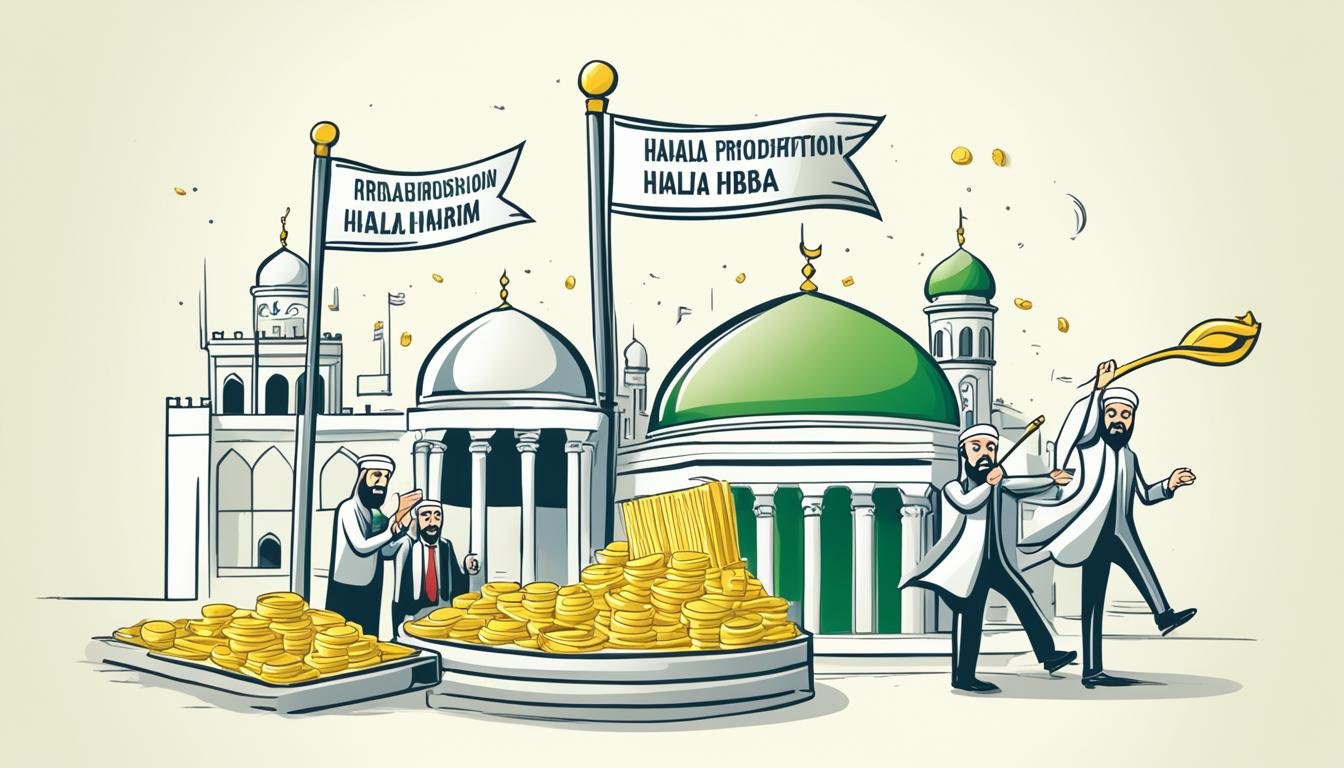Key Principles: Prohibition of riba, gharar, and haram activities
Have you ever wondered why some financial systems thrive while others struggle, despite both offering similar services? The answer lies in the foundational principles that govern them. In the realm of Islamic finance, the prohibition of riba (interest), gharar (uncertainty), and haram activities are crucial for ensuring ethical and just transactions. These fundamental rules are derived from Islamic teachings in the Quran and Sunnah and set a clear distinction from conventional financial systems.
With approximately $4 trillion in assets under management and an annual growth rate of 10%–15%, the Islamic finance sector plays a significant role in the global economy. This ecosystem stresses risk-reward sharing, promoting cooperation through profit-loss sharing instead of reliance on debt which often leads to exploitative practices.
As we explore the prohibition of riba, gharar, and haram activities, it is essential to understand how these principles are implemented in modern finance and why they are vital for ethical banking and financial inclusion.
Understanding Islamic Finance
Islamic finance represents an ethical banking system that strictly adheres to Sharia law, focusing on economic justice and social welfare. This unique approach significantly differs from conventional finance, which often incorporates interest and speculative practices that can lead to economic inequality. The principles of Islamic finance prioritize social and ethical standards in all transactions, fostering trust and transparency among stakeholders.
The sector has experienced remarkable growth, currently overseeing over $2 trillion in assets. With an annual growth rate between 15% and 25%, Islamic finance continues to capture the interest of investors who are increasingly aware of ethical considerations in their financial dealings. In this system, profit-and-loss sharing arrangements play a crucial role, encouraging the equitable distribution of risk and wealth.
- Non-interest banking methods are utilized, ensuring that all transactions comply with Sharia guidelines.
- Investments are focused on sharia-compliant investments, steering clear of industries that violate Islamic principles.
- The financing structures often include contracts such as mudarabah, musharakah, and Ijarah.
Islamic finance not only promotes financial stability but also cultivates a sense of community by reflecting shared values and responsibilities. As this sector continues to mature, the global market will likely witness an increase in awareness and acceptance of Islamic finance as a viable and ethical alternative to conventional banking.
The Concept of Riba in Islamic Finance
Riba, a fundamental concept in Islamic finance, refers to any unjust gain acquired through financial transactions. This concept emphasizes fairness and ethical dealings, aligning with the values of the prohibition of riba set forth in Islamic law. The term originates from the Arabic root “raba-wa,” suggesting growth or increase. Understanding the definition of riba is essential for those looking to navigate the landscape of riba-free loans.
Definition and Interpretation of Riba
The prohibition of riba encompasses various forms of interest and usury, marking a significant distinction in Islamic finance. This prohibition aims to promote ethical financing, ensuring that all financial dealings contribute positively to society. By avoiding riba, investors support economic stability and social justice, guiding their financial practices away from exploitative situations.
Categories of Riba: Riba al-Fadl and Riba al-Nasi’ah
Riba is primarily categorized into two forms:
- Riba al-Fadl: This category involves excess material gain in exchanges of goods, particularly of the same type, such as gold for gold or wheat for wheat. The idea is to maintain equity and fairness in trades.
- Riba al-Nasi’ah: This refers specifically to the interest or additional fees charged on loans and credit. Islamic finance seeks to provide riba-free loans, ensuring that lending practices remain just and charitable rather than profit-driven.
The Prohibition of Riba, Gharar, and Haram Activities
The ethical framework of Islamic finance strongly centers on the prohibition of riba, gharar, and various haram activities. Riba, or interest, is unequivocally forbidden in Islamic teachings due to its exploitative nature. This prohibition promotes a financial system that fosters equity and mutual support instead of undue exploitation.
Gharar, representing excessive uncertainty in transactions, creates a foundation for injustice. Islamic finance emphasizes the importance of clarity and transparency in contracts, allowing parties to engage in transactions with mutual consent and clear expectations. Contracts that adhere to these principles mitigate risks associated with gharar and align with the ethical standards of Sharia law.
Haram activities encompass all actions that contradict Islamic principles, including investments in gambling or unethical businesses. Islamic finance encourages participants to engage in halal endeavors, which not only comply with religious guidelines but also promote economic stability. Financial transactions must remain free from prohibited elements, ensuring that each contract’s subject matter is halal, reflecting the overarching aim of fairness within the market.
Financial contracts are categorized in various ways, influencing their legitimacy under Islamic law. A sahih contract is valid when all required elements are fulfilled without any presence of prohibited attributes. Conversely, fasid contracts may have valid components but also include forbidden elements. On the other hand, batil contracts are fundamentally void, lacking legal effect. Such classifications underline the critical need for vigilance against riba, gharar, and haram activities within Islamic finance.
Gharar: The Concept of Uncertainty in Transactions
The concept of gharar plays a crucial role in Islamic finance, primarily focusing on uncertainty in financial transactions. This principle aims to create fairness and transparency, preventing potential injustice that might arise from ambiguous agreements. Scholars often divide gharar into categories to highlight its significance in maintaining ethical financial practices.
Types of Gharar: Gharar Fahish and Gharar Yasir
Gharar can be categorized into two notable types:
- Gharar Fahish: This refers to excessive uncertainty that can lead to serious injustices in transactions. Such levels of gharar are strictly avoided in the framework of Islamic finance.
- Gharar Yasir: This type encompasses minor uncertainties that may exist in certain dealings. While some uncertainty is unavoidable, Islamic finance encourages minimizing its presence.
Examples of Gharar in Modern Financial Transactions
Numerous examples illustrate gharar in financial transactions today. Common practices that embody this concept include:
- Speculative Trading: Engaging in trades based on predictions rather than concrete data often leads to gharar.
- Futures and Options Contracts: These involve agreements for future delivery, carrying substantial uncertainty related to price and availability.
- Short Selling: This method relies on the hope of purchasing assets at a lower price later, creating a speculative environment that Islamic finance prohibits.
- Derivatives: Transactions such as forwards and options are forbidden due to their inherent uncertainties regarding future asset delivery.
Understanding Haram Activities in Islamic Finance
In Islamic finance, understanding the nature of haram activities is essential. These activities directly violate the principles set forth by Sharia law and have significant implications for financial practices. By identifying and avoiding these activities, individuals and institutions can better align their financial dealings with Islamic teachings.
Activities Considered Haram
Participants in the financial sector must steer clear of various activities deemed haram, which include:
- Gambling and any form of games of chance
- Production and sale of alcohol
- Trading in pork and pork products
- Engaging in speculation and excessive uncertainty in contracts
Each of these practices undermines the core values of ethical banking and sharia-compliant investments, making their avoidance crucial for compliance.
Impact of Haram Activities on Sharia Compliance
The engagement in haram activities has far-reaching consequences, threatening the integrity of financial institutions. Financial entities found to be involved in such practices may lose their Sharia-compliant status, diminishing trust among investors and clients. Adhering to the prohibitions against haram activities not only strengthens the credibility of ethical banking but ensures that sharia-compliant investments foster positive contributions to communities.
Differences Between Conventional and Islamic Finance
The financial landscape is marked by distinct systems, notably conventional finance and Islamic finance. Conventional finance often centers on the generation of profit through interest-bearing loans and speculative practices. This contrasts sharply with Islamic finance, which operates under strict ethical guidelines. Islamic finance strictly prohibits riba, or interest, ensuring that all financial transactions adhere to Islamic principles.
Core concepts of risk-sharing and profit-sharing are pivotal in Islamic finance. Modalities such as mudarabah, which involves partnership agreements, and musharakah, involving joint ventures, reflect a commitment to equitable economic transactions. These principles foster ethical banking practices that aim to create social justice and the fair distribution of wealth.
The global presence of Islamic finance is notable, with more than 300 institutions holding substantial assets. Over the past decade, the Islamic banking sector has expanded at an average rate of 15% annually, demonstrating its resilience and growth potential. Areas with a significant Muslim population have seen increased adoption of Islamic banking, offering more ethical alternatives compared to conventional finance.
Interest rates pose challenges for the expansion of Islamic banking, often hindering its acceptance in regions with high rates. Yet, Islamic banking thrives in well-established financial environments, where it provides complementary options alongside conventional institutions. This unique fintech approach has led to a surge in Islamic financial assets, projected to reach approximately $5.9 trillion by 2026.
Importance of Prohibition in Ethical Banking
The prohibition of riba plays a crucial role in the foundation of ethical banking. By eliminating interest-based transactions, Islamic financial institutions create an environment that promotes fairness and transparency. This ethical framework encourages sharia-compliant investments that foster equitable financial growth and social responsibility.
Under ethical banking principles, the system designed around the prohibition of riba maintains a trust-based approach. Participants are encouraged to engage in mutually beneficial agreements where the risk and reward are shared. This commitment to ethical dealings contributes to a robust financial ecosystem that serves the wider community.
Furthermore, adhering to these prohibitions helps build consumer confidence in Islamic financial institutions. As individuals seek alternatives that align with their values, the emphasis on ethical standards enhances the appeal of sharia-compliant investments. Ultimately, this commitment to ethical banking cultivates a more just and equitable economy.
Challenges in Adhering to Islamic Financial Principles
Islamic finance principles offer a robust framework aimed at promoting ethical banking practices. Despite this strong foundation, significant challenges in Islamic finance emerge, particularly in navigating modern financial landscapes. The rapid evolution of global markets often conflicts with traditional interpretations of Sharia law, leading to uncertainty regarding compliance.
Many practitioners face hurdles, including a lack of understanding of the intricate details of Islamic financial guidelines. Continuous education is vital for professionals to tackle these challenges effectively. Stakeholders must be well-informed about the core tenets of Islamic finance to create sustainable financial solutions.
Furthermore, the promotion of ethical banking through risk-sharing and profit-sharing mechanisms fosters an environment conducive to social welfare. Yet the increasing pressure to adopt conventional banking practices can create dilemmas for Islamic institutions striving to remain true to their principles.
In overcoming these challenges in Islamic finance, innovative approaches are essential. Developing robust regulatory frameworks will enable greater harmony between traditional Islamic finance principles and contemporary financial realities. As the landscape continues to evolve, addressing the pressing needs for compliance and educational initiatives will ensure the longevity and integrity of ethical banking practices within the Islamic finance sector.
Conclusion
The prohibition of riba, gharar, and haram activities lies at the heart of Islamic finance, fostering a financial environment rooted in ethics and social justice. Recent studies, including a survey conducted in Malaysia, reveal a significant lack of awareness among the public regarding these prohibited elements, highlighting the urgent need for educational initiatives. Although Islamic banks have operated in Malaysia since 1983, findings indicate that prohibited activities still permeate daily transactions, affecting the integrity of Islamic finance.
Through the teachings of the Holy Quran, the gravity of avoiding riba, gharar, and maysir is evident, as these concepts safeguard against exploitation and encourage fairness in financial dealings. As the global Islamic finance industry continues to expand, the importance of promoting awareness and education concerning these principles cannot be overstated. Leveraging social media as a tool for knowledge dissemination could significantly enhance understanding among Muslims about the implications of prohibited elements in their everyday transactions.
In summary, upholding the prohibition of riba, gharar, and haram activities is essential for the ethical advancement of Islamic finance. By prioritizing education and awareness, we can ensure that this financial movement is aligned with its foundational values and equipped to address both its opportunities and challenges as it evolves.
Source Links
- Important Principles & Components of Islamic Finance System – Musaffa Academy
- Prohibition of Riba, Maysir and Gharar
- Microsoft Word – Islamic Economic Principles Prohibition of Riba Gharar and Maysir
- Islamic Finance
- Working With Islamic Finance
- Introduction to Islamic Finance
- The Prohibition Of Riba And Gharar In Islamic Finance – FasterCapital
- Gharar: Meaning, Definition, Islamic Perspective, and Examples
- Repos in Islamic Finance | White & Case LLP
- Understanding the Islamic Prohibition of Interest: A Guide to Aid Economic Cooperation Between the Islamic and Western Worlds
- Islamic finance
- Finance and Development
- Islamic Banking and Finance Definition: History and Example
- Islamic banking and finance
- Islamic Finance
- Riba-Free Living: How to Align Your Finances with Islamic Law
- The Prohibition of Riba’







